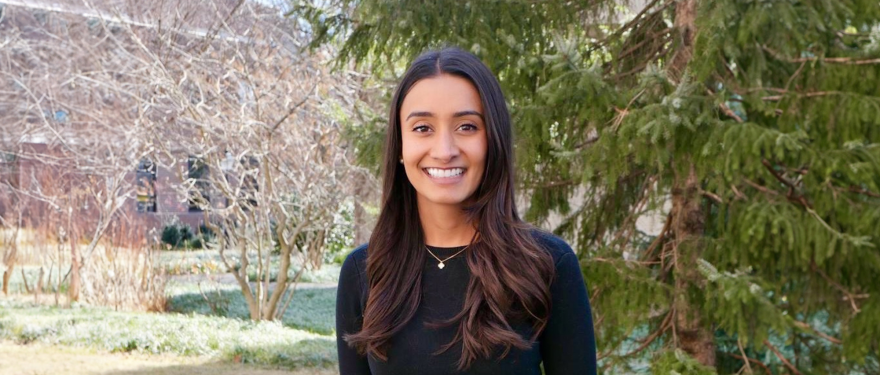The HBS 2+2 program is a deferred admission process for current students in their final year of study, either in college or a full-time master’s degree program. If you are admitted through 2+2, you work for two to four years in a field of your choice before enrolling in the regular HBS MBA Program. We sat down with Zoe Bhargava (MBA 2025) to hear more about how she spent her deferral years.
Why did you decide to apply to HBS via the 2+2 deferred admissions process?
As an undergraduate business major at the University of California, Berkeley, I was hesitant to pursue another business degree, especially as I had recently pivoted my career plan from finance to tech after two summers interning at technology companies. After interning at Twitter my sophomore summer, I spent the following two years involving myself in the entrepreneurial ecosystem at Berkeley. This is when I heard about the opportunity to apply to HBS through the deferred 2+2 program. It seemed like a risk-free opportunity, so I decided to take the GMAT and give it a try. After researching HBS and exploring its entrepreneurial opportunities, including those at the Rock Center, iLab, and in the entrepreneurship curriculum itself, I realized that pursuing an MBA still aligned with my future career aspirations of building and growing companies.
What job(s) did you work during your deferral?
After gaining admission in June 2019, I had planned on spending three to four years in my deferral period before matriculating at HBS. I was excited to be returning to Twitter to work full time, yet I also had an itch to try my hand at working at a startup. After two and a half years at Twitter working on our Strategic Finance team supporting our Sports, Media, Entertainment Partnerships organization, I had an opportunity to join a sports tech startup along with that startup’s product team. I started as a Product Analyst, leveraging my skills and experience from Twitter and grew into a Product Manager role. I spent the following one and a half years learning A TON in a wildly different setting with daily challenges I had never faced before. The start-up ceased operations in June 2023, but the lessons I learned will be invaluable to my future career as a potential founder. Before starting at HBS in Fall 2023, I was able to squeeze in one more opportunity over the summer as a Growth Strategy & Operations intern at Andreessen Horowitz (a16z). In this role I got to see another side of tech and startups – the investor and VC world.
Did 2+2 change your path or alter your post-undergraduate plans?
The risk-free nature of the four-year deferral period allowed me to confidently show up on campus with experiences in big tech, startups, and venture capital. Had I not had my 2+2 admissions letter in hand, I may not have felt comfortable switching jobs especially given that my deferral period was amidst the COVID-19 pandemic. I saw many peers stay in roles longer than they would have intended given the fluctuating and often uncertain job market. Joining a Series A startup was a huge risk, but that was exactly the beauty of the 2+2 program – it allowed me and even encouraged me to take such a risk. These experiences will not only be beneficial for my future career, but also led me to be a stronger MBA candidate with more diverse experiences to draw upon during the case method.
What advice do you have for prospects considering the 2+2 program?
For all prospective 2+2 applicants, I’d like to stress that there is not one career plan or typical path for those wishing to pursue their MBA. The classmates in my section come from such a variety of backgrounds and experiences that there is clearly no one “right type” of candidate who should apply to the HBS 2+2 program. If you have any inkling to apply, I’d recommend you explore the HBS website to see just what an HBS MBA could bring to you in the future!

